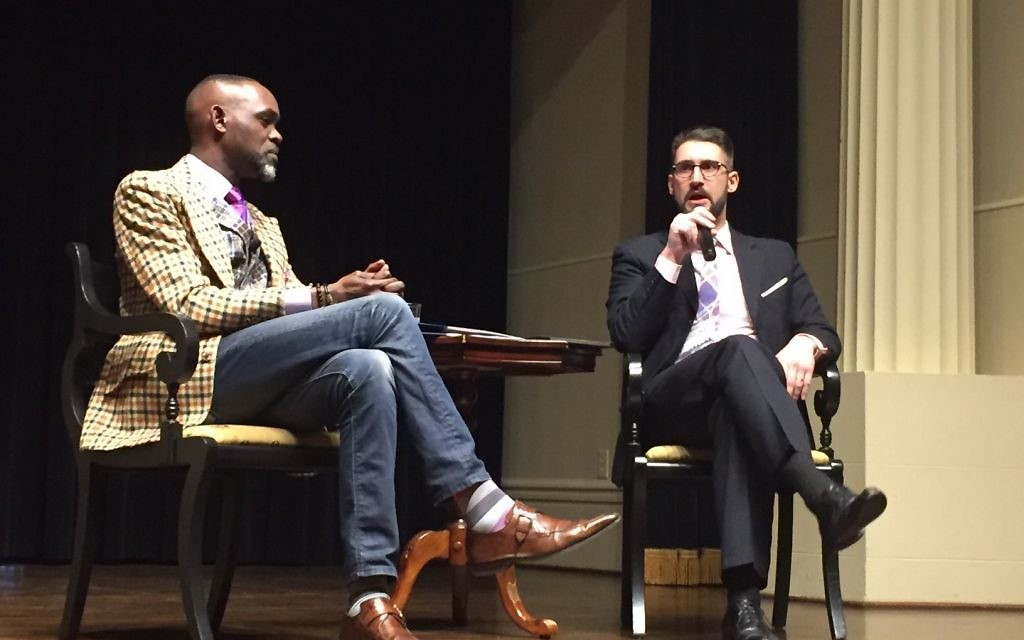Kayongo: Refugees Fuel Marketplace of Skills
NCCHR CEO Derreck Kayongo discusses Immigrants Skills in Marketplace.

Most immigrants leave their home country because of a regime change or loss of economic stability, National Center for Civil and Human Rights CEO Derreck Kayongo said during the third annual Leadership and Multifaith Program Symposium in Atlanta on Monday, Feb. 6.
The program, examining multi-faith and community responses to asylum, refuge and relocation, provides community leaders, religious organizations and students the opportunity to connect with local organizations that work with refugees. The event is a collaboration between the Ivan Allen College of Liberal Arts at Georgia Tech and Candler School of Theology at Emory. Kayongo and his associate director, Harold J. Berman Fellow Silas Allard, presented the keynote address on how the legal power of protecting rights expands the marketplace.
Kayongo’s path to refugee status started when Gen. Idi Amin Dada seized power in Uganda through a military coup in 1971. For the next eight years, Amin persecuted the Lango and Acholi ethnic groups in retaliation for exiles’ attempt to invade Uganda.
Get The AJT Newsletter by email and never miss our top stories Free Sign Up
Kayongo and his family lived a comfortable life until one of Amin’s men entered their apartment one night and shouted for them to get out. Amin’s soldiers selected four men and lined them up for a firing squad to retaliate for the death of a soldier.
“We were killing for stupid things,” Kayongo said. “Neighbors were turning on each other to place the blame. Can you imagine your neighbor turning on you?”
Kayongo witnessed a man who had just arrived in the village take the blame for everyone with one gunshot. Kayongo and his family then escaped to Kenya before immigrating to the United States.
He went on to graduate from the Fletcher School of Law at Tufts University and received a CNN Hero award for his Global Soap Project. “People gave me a chance in the United States, and I can’t imagine where I would be without that.”
Kayongo is proud to live in America and believes that this country’s history is woven with immigrants’ stories. Immigrants add value to the places where they settle and bring skills and knowledge, which Kayongo referred to as the marketplace. Legal barriers to immigration damage the global marketplace.
“How much culture, infrastructure and diversity did Germany lose when it senselessly murdered Jewish doctors, attorneys, artists and musicians?” Kayongo said, wondering how long it would take to retrain people in those fields.
Since the Trump administration’s executive orders restricting immigration and refugees, courts and legal scholars have wrestled with the law. President Donald Trump said he would not appeal a circuit court ruling that blocked his order addressing seven majority-Muslim countries and all refugees.
Allard responded to Kayongo’s address.
Allard is a member of the advisory committee of the Georgia Immigration Working Group, and his research focuses on the ethics of migration policy. He considers the rule of law to be a system of power, and when it is exercised arbitrarily, the rule of law breaks down.
“The executive order that was passed by the new administration has an arbitrary element,” Allard said, which can do more harm than good. “The administration selected seven countries seemingly arbitrarily even though there are other countries who have problems with governance and violence; the administration’s criteria do not appear to hold up.”
The Obama administration enacted a temporary visa waiver program in 2015 on Iran, Iraq, Syria and Sudan and later added Libya, Yemen and Somalia — the seven countries Trump targeted.
People migrate frequently; that’s part of the human experience. But Allard said the law looks at those crossing borders in a different way. Asked whether the Unites States has a right to protect its citizens’ security, he said, “Although we should be cognizant of citizens’ rights to safety and security, we must consider the administration passed the ban off fear. It was not empathetic to welcoming and embracing other people.”
Representatives of organizations that work with refugees also spoke about global partnerships and faith-based local solutions for refugees.
Ilise Cohen, who leads Jewish Voice for Peace in Atlanta and helps coordinate the Jews of Color/Sephardi/Mizrahi caucus partnering with JVP, said: “Israel destroyed the Palestinian economy. They warehouse Palestinian labor, and the population is not protected at all.”
Kayongo said she was raising a policy issue, and he did not wish to go into details about the conflict. But he addressed the need to speak up about disadvantages in the marketplace, such as jobs lost by Palestinians when the boycott, divestment and sanctions movement, which JVP supports, pressures a company to close a factory in the West Bank.
America has remained a destination of hope for those seeking refuge for centuries, but “I’m not going to be a refugee again,” Kayongo said. “I’m proud of this country because I have heard so many bad stories turn out well and have a positive outcome. It’s not easy being a refugee, but we are relying on you for help.
“This is the perfect opportunity for people to ask themselves, are you still alive? Are you still awake? It’s an opportunity to know your identity and a chance to become even stronger.”




comments